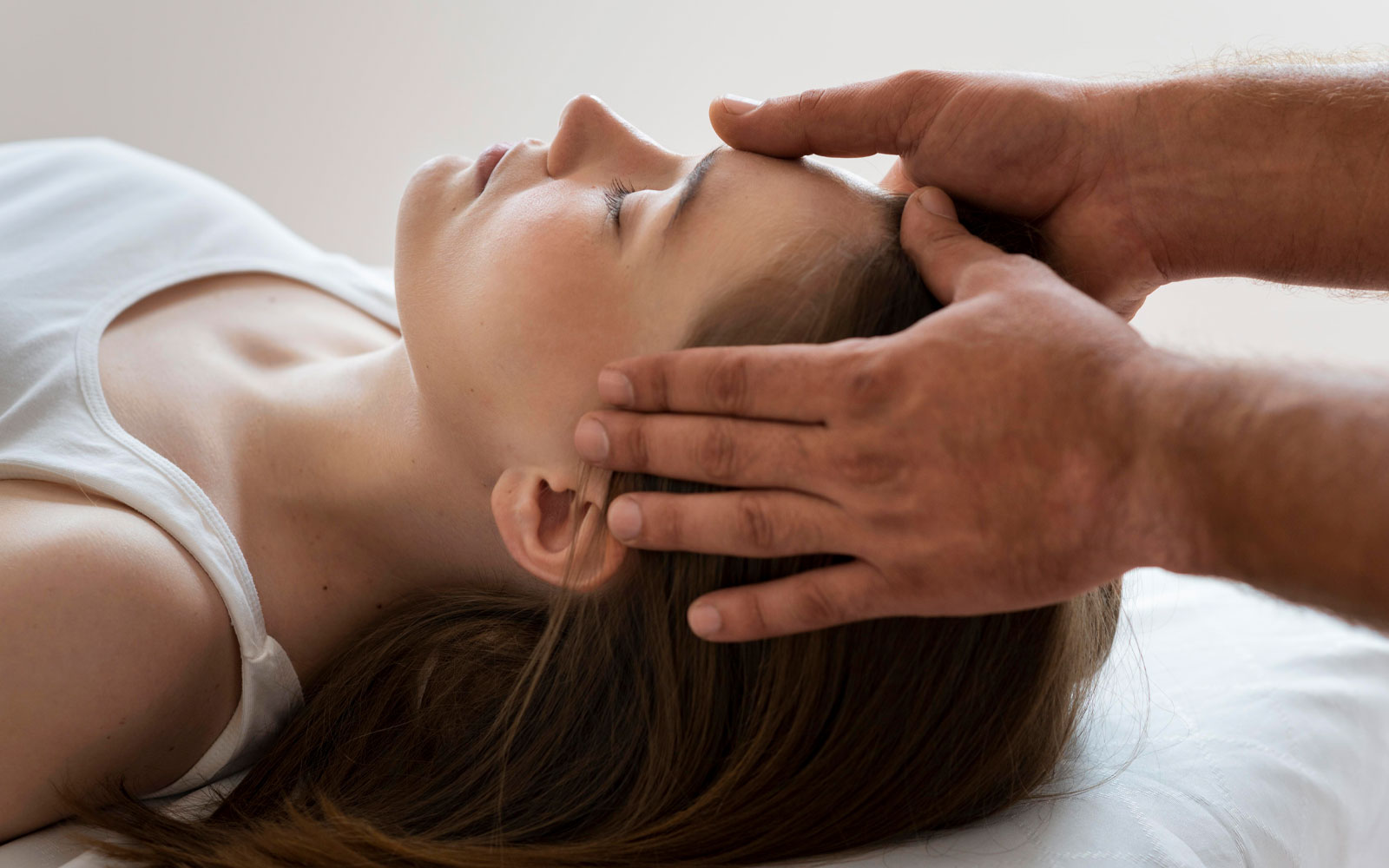
Can Osteopathy Help with Anxiety and Depression?
Understanding the Link Between Mental Health and Physical Health
Mental health conditions such as clinical depression and clinical anxiety require careful assessment and treatment from qualified professionals, including doctors and psychotherapists. These conditions often involve complex, underlying psychological and biochemical factors, and treatment may involve medication such as antidepressants, therapy, or a combination of both. While osteopathy can provide supportive care by addressing the physical symptoms related to stress and anxiety, it is not a substitute for professional mental health treatment. Osteopathy works alongside other treatments to enhance overall wellbeing, reduce physical tension, and promote relaxation, but it should not be considered a primary treatment for clinical mental health conditions. Always seek appropriate medical advice when managing mental health concerns.
How Stress and Anxiety Affect the Body
Stress and anxiety activate the body’s “fight or flight” response, leading to a cascade of physical reactions. Elevated stress hormones such as cortisol can cause muscle tension, restricted breathing, and heightened sensitivity to pain. Over time, chronic stress can contribute to conditions like back and neck pain, joint stiffness, and digestive issues, all of which further impact mental health.
Osteopathic treatment helps mitigate these effects by addressing areas of tension and restriction within the body. Techniques such as soft tissue manipulation and joint mobilisation encourage relaxation, improve circulation, and support the body’s natural healing processes. This physical relief often translates to emotional benefits, creating a sense of calm and reducing the physical burdens of anxiety.
The Connection Between Posture, Pain, and Mental Wellbeing
Poor posture, often exacerbated by modern lifestyles, is closely tied to both physical discomfort and mental health challenges. Slouching, forward head posture, and prolonged sitting can contribute to musculoskeletal imbalances, leading to pain and reduced mobility. These physical limitations can, in turn, impact self-confidence and mood, perpetuating a cycle of discomfort and distress.
Osteopathy addresses these issues by improving posture and alignment, reducing strain on muscles and joints. By enhancing the body’s physical function, osteopathy supports a healthier, more confident posture, which can positively influence mental wellbeing. This dual approach highlights the interconnected nature of physical and mental health, showing how addressing one can benefit the other.
If you’re seeking a holistic way to manage anxiety and depression, osteopathy may offer valuable support by addressing the physical manifestations of mental health challenges and promoting overall balance and wellbeing.
How Osteopathy Addresses Anxiety and Depression
The Role of the Parasympathetic Nervous System in Relaxation
Osteopathy’s ability to influence the parasympathetic nervous system is a key factor in its effectiveness for managing anxiety and depression. The parasympathetic system, often called the “rest and digest” system, promotes relaxation and recovery. Many osteopathic techniques are designed to shift the body from a stressed, “fight or flight” state to this calmer mode, allowing the body to relax and begin its natural healing processes.
Through gentle manipulation of the spine, joints, and surrounding tissues, osteopaths help reduce nervous system overactivity, encouraging a sense of calm and reducing the physical symptoms of stress. This relaxation not only soothes the body but also fosters a mental state conducive to emotional recovery and balance.


Releasing Muscle Tension to Alleviate Mental Stress
Chronic muscle tension is a common physical symptom of anxiety and depression, often experienced in areas like the neck, shoulders, and back. These tight muscles can perpetuate discomfort and contribute to feelings of stress, creating a cycle that is difficult to break. Osteopathy addresses this tension directly through soft tissue manipulation and myofascial release, helping to relieve physical strain and promote relaxation.
By easing muscle tension, osteopathy not only alleviates pain but also reduces the body’s overall stress load, making it easier for individuals to manage anxiety and emotional challenges. This physical release often leads to a profound sense of relief, as the body and mind feel lighter and less burdened by stress.
Improving Circulation and Its Impact on Emotional Balance
Good circulation is essential for both physical and mental health. When blood flow is restricted due to muscle tension or poor posture, the delivery of oxygen and nutrients to tissues is compromised, potentially exacerbating fatigue, irritability, and low mood. Osteopathic techniques aim to enhance circulation by addressing physical restrictions and improving overall alignment.
Improved blood flow not only supports the body’s healing processes but also has a calming effect on the mind. Proper circulation can help stabilise energy levels, reduce feelings of lethargy, and support the brain’s production of mood-regulating chemicals. By addressing these physical factors, osteopathy creates a foundation for improved emotional resilience and balance.
If you’re exploring ways to manage anxiety and depression, osteopathy provides a holistic approach that addresses both the physical and emotional impacts of these conditions, helping you achieve a greater sense of overall wellbeing.

Always really happy with the knowledge and professionalism I receive.
August 28, 2023
The Benefits of Osteopathy for Stress Management

Reducing Cortisol Levels Through Manual Therapy
Stress and anxiety often lead to elevated cortisol levels, the body’s primary stress hormone. Persistent high cortisol can have negative effects on both physical and mental health, contributing to fatigue, weight gain, and even mood instability. Osteopathy’s manual techniques, such as soft tissue manipulation and cranial osteopathy, help activate the parasympathetic nervous system, which is responsible for calming the body.
By promoting relaxation and releasing physical tension, osteopathy can lower cortisol levels, helping to break the cycle of chronic stress. This reduction not only eases the body’s physical strain but also creates a more balanced emotional state, supporting long-term stress management.
Enhancing Sleep Quality to Support Mental Health
Sleep is a vital component of mental health, yet stress and anxiety often disrupt sleep patterns, leading to insomnia or restless nights. Osteopathic treatment can help improve sleep quality by addressing physical discomfort, such as tension in the back or neck, and calming the nervous system.
Through techniques that promote better alignment and circulation, osteopathy helps ease the body into a state of restfulness. Patients frequently report more restorative sleep after osteopathic sessions, which supports their mental health and emotional resilience. A good night’s sleep can significantly enhance mood, cognitive function, and overall wellbeing.


Achieving Greater Mind-Body Awareness
One of the less tangible but equally important benefits of osteopathy is its ability to cultivate greater mind-body awareness. By focusing on how physical tension and posture relate to emotional health, osteopathy encourages patients to tune into their bodies and recognise patterns of stress.
This heightened awareness empowers individuals to identify and address physical signs of stress before they escalate. Simple changes, such as correcting posture or incorporating regular stretching, can make a significant difference in maintaining balance and reducing the impact of daily stressors.
Through its holistic approach, osteopathy not only helps alleviate existing stress but also equips patients with the tools to manage it more effectively, fostering both immediate relief and long-term mental health benefits.
Can Osteopathy Complement Other Treatments for Anxiety and Depression?

Integrating Osteopathy with Psychotherapy and Medication
Osteopathy works effectively alongside psychotherapy and medication as part of a comprehensive treatment plan for anxiety and depression. While psychotherapy addresses thought patterns and emotional responses, osteopathy focuses on the physical manifestations of mental health challenges. For instance, manual therapy techniques can relieve muscle tension, improve posture, and activate the body’s natural relaxation mechanisms, all of which can enhance the effectiveness of psychological treatments.
Medication prescribed for anxiety and depression often helps regulate chemical imbalances in the brain but may not address the physical toll these conditions take on the body. Osteopathy bridges this gap by promoting overall physical wellness, which in turn can boost emotional resilience and improve how patients respond to other treatments. The synergy between these approaches ensures a well-rounded strategy for tackling mental health concerns.
Supporting Holistic Recovery for Emotional Wellbeing
A holistic approach to recovery acknowledges the interconnectedness of mental, emotional, and physical health. Osteopathy complements other treatments by providing tangible physical relief that supports emotional healing. Techniques such as cranial osteopathy or gentle joint mobilisation not only ease physical discomfort but also promote a deep sense of relaxation and emotional balance.
Osteopathy also encourages patients to take an active role in their recovery by fostering greater awareness of how lifestyle, stress management, and posture influence their mental state. By addressing both immediate physical symptoms and long-term patterns of tension, osteopathy empowers individuals to build a more sustainable foundation for their mental health journey.
For those integrating osteopathy into their treatment plans, the combined benefits of physical and emotional care can create a powerful pathway to recovery, enhancing overall quality of life and long-term wellbeing.
Whether you’re seeking pain relief, better mobility, or improved circulation, Sanderstead Osteopaths can help. Our experienced osteopaths deliver comprehensive care tailored to your unique needs, ensuring you receive lasting benefits. Schedule an appointment today and take the first step toward a healthier, more active life.
What to Expect During an Osteopathy Session for Anxiety and Depression

Tailored Treatments Based on Individual Needs
Every osteopathy session for anxiety and depression is uniquely tailored to the individual’s specific needs. During the initial consultation, the osteopath takes a comprehensive history, considering physical symptoms, mental health concerns, lifestyle factors, and stress levels. This holistic assessment allows the practitioner to design a treatment plan that targets both physical discomfort and emotional stressors.
The treatment may focus on areas where tension is commonly stored, such as the shoulders, neck, and back. If posture or movement patterns contribute to feelings of stress or anxiety, the osteopath will work to correct these imbalances. Gentle manual techniques are often combined with guidance on relaxation exercises and self-care strategies to extend the benefits of the session into daily life.
Techniques to Release Stress and Enhance Relaxation
During a session, the osteopath employs techniques specifically designed to release physical tension and encourage relaxation. These may include soft tissue manipulation to alleviate muscle tightness, cranial osteopathy to calm the nervous system, and joint mobilisation to improve circulation and reduce stiffness. These gentle, hands-on methods are aimed at reducing the physical burden of anxiety and depression, helping the body shift into a more relaxed state.
By targeting the parasympathetic nervous system, osteopathic techniques promote a state of calm and balance. The physical release of tension often translates into emotional relief, allowing patients to feel lighter and more centred after treatment. For many, this supportive and soothing approach provides a welcome complement to traditional therapies for anxiety and depression, fostering a sense of overall wellbeing and mental clarity.

What to Expect During an Osteopathy Session for Anxiety and Depression
Tailored Treatments Based on Individual Needs
During an osteopathy session for anxiety and depression, the approach is highly personalised to address the unique needs of each individual. The session typically begins with an in-depth consultation where the osteopath gathers information about your medical history, lifestyle, and mental health challenges. This assessment helps identify areas of tension, physical discomfort, or postural imbalances that may be contributing to emotional stress.
Our osteopaths develop treatment plans designed to alleviate both physical and emotional strain. For example, if you experience chronic neck tension due to anxiety, the treatment may focus on relieving tight muscles and improving blood flow in this area. Similarly, if poor posture exacerbates your feelings of stress, the osteopath may work to correct misalignments and provide advice on maintaining better body mechanics in daily life.


Techniques to Release Stress and Enhance Relaxatio
Osteopathy sessions often involve gentle, non-invasive techniques aimed at reducing stress and promoting relaxation. Soft tissue manipulation can help relieve muscle tension that builds up from prolonged stress or anxiety, while joint mobilisation may improve circulation and reduce stiffness. Cranial osteopathy, a subtle technique focused on the head and spine, is particularly effective for calming the nervous system and promoting a sense of inner peace.
These hands-on techniques are not only physical but also deeply soothing, encouraging the body to transition from a heightened state of stress to one of relaxation. Your osteopath may also incorporate breathing exercises or suggest mindfulness practices to complement the physical treatment, helping you sustain the benefits of the session over time. For many, these sessions create a restorative experience, leaving them feeling lighter and more balanced both physically and emotionally.
Embracing the Mind-Body Benefits of Osteopathy

Why Mental Health and Physical Health Go Hand-in-Hand
Mental health and physical health are intrinsically connected, with each influencing the other in profound ways. Anxiety and depression often manifest physically as muscle tension, poor posture, or disrupted sleep, while chronic physical discomfort can heighten feelings of stress and emotional strain. Osteopathy bridges this gap by addressing both the physical symptoms and their underlying emotional triggers, fostering a sense of holistic wellbeing.
Through hands-on techniques that alleviate tension, improve circulation, and promote relaxation, osteopathy helps to break the cycle of physical discomfort and emotional distress. As the body becomes more balanced, mental clarity and emotional stability often follow, reinforcing the connection between physical health and mental resilience.
Achieving Lasting Balance with Osteopathic Care
Osteopathy is not just a one-time solution—it’s a path toward achieving lasting balance and harmony within your body and mind. Regular sessions can help maintain physical alignment and reduce the build-up of stress-related tension, creating a stable foundation for improved mental health. By combining osteopathic care with other supportive practices, such as therapy or mindfulness, individuals can experience a more comprehensive recovery.
For those managing anxiety and depression, osteopathy provides a gentle yet effective approach that prioritises long-term wellbeing. With its focus on the interconnectedness of the body and mind, osteopathic care empowers you to embrace a healthier, more balanced life, one where physical and emotional wellness go hand in hand.
If you’re curious about how a personalised osteopathic treatment could support your recovery and overall health, Sanderstead Osteopaths is here to help. Book your first appointment with us today and experience the difference a holistic, hands-on approach can make.
Start Your Journey to Better Mental Health with Sanderstead Osteopaths
Why Choose Us for Anxiety and Depression Support?
At Sanderstead Osteopaths, we understand the profound connection between physical health and mental wellbeing. Our experienced team is committed to providing tailored care that addresses not only the symptoms of anxiety and depression but also their underlying physical contributors. With a compassionate, patient-centred approach, we focus on creating a calming environment where your needs are heard and respected.
By integrating advanced osteopathic techniques with an understanding of mental health challenges, we aim to help you rediscover balance, reduce stress, and support emotional recovery. Whether you’re seeking to complement existing treatments or exploring osteopathy as a new avenue for relief, our personalised care plans are designed to help you achieve lasting results.


Book Your Consultation Today and Take the First Step Toward Wellness
Your journey to better mental health starts with a single step. At Sanderstead Osteopaths, we’re here to guide you every step of the way, offering expert care and support to help you feel your best. Booking a consultation is easy, and our friendly team is ready to answer any questions you may have about osteopathy and its benefits for anxiety and depression.
Don’t let stress or emotional challenges hold you back from living a fulfilling life. Contact us today to schedule your appointment and experience the transformative effects of osteopathy. Together, we can create a path to improved physical health and emotional wellbeing, tailored just for you.
Invest in your future health with the help of Sanderstead Osteopaths. Our preventative care plans are tailored to your lifestyle, helping you stay active, comfortable, and pain-free. Schedule an appointment today and take the first step toward lasting musculoskeletal wellness.



